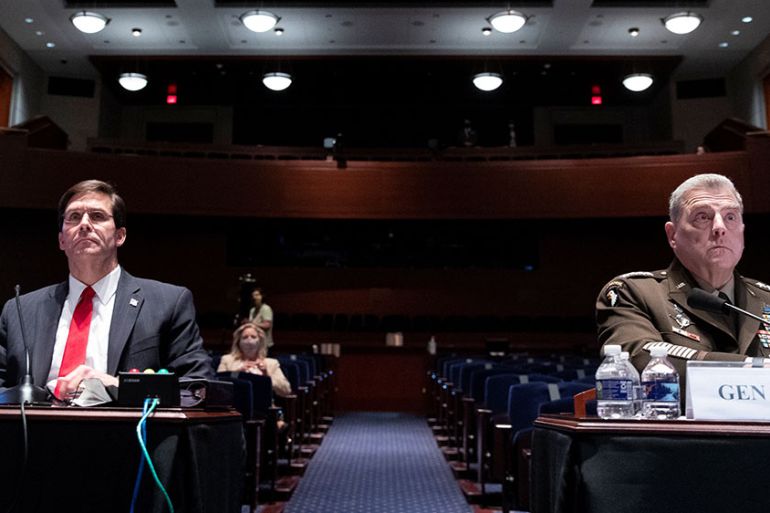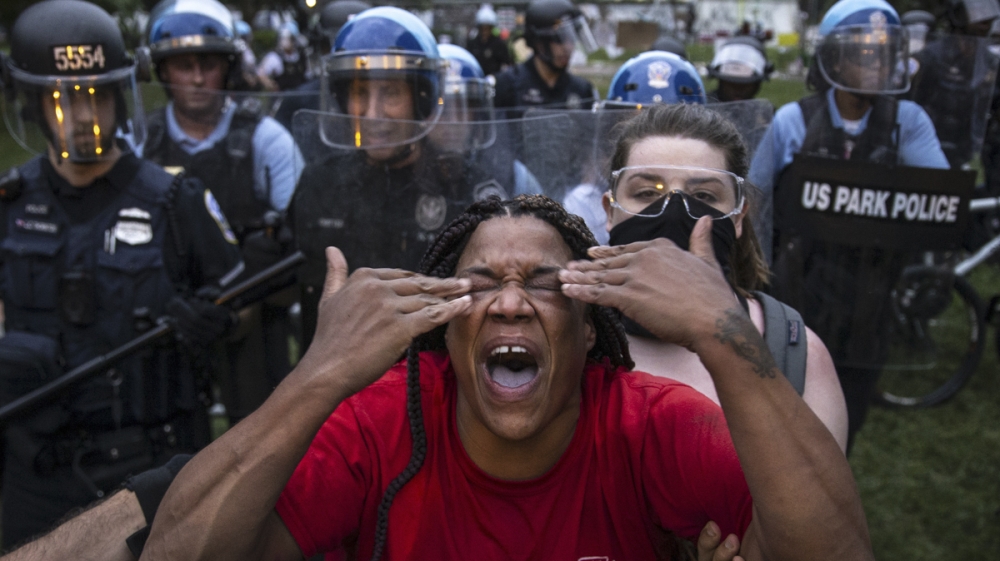Pentagon chief: US should take ‘hard look’ at Confederate symbols
Chairman of the Joint Chiefs of Staff calls for ‘rational, mature discussion’ about bases named for Civil War icons.

The top general in the United States said on Thursday the military had to take a “hard look” at symbols of the Confederacy – including the names of bases – and said he had recommended a commission to look at the issue even as President Donald Trump has ruled out renaming military bases named after Confederate leaders.
Despite Americans being more conscious about race issues following the death of George Floyd while in Minneapolis police custody, Trump has favoured keeping the names of 10 military bases from Virginia to Texas named for Confederate military leaders.
Keep reading
list of 4 itemsFormer US police officer sentenced in killing of Black man Elijah McClain
US paramedics found guilty in 2019 death of Black man Elijah McClain
Angela Davis: ‘Palestine is a moral litmus test for the world’
Chairman of the Joint Chiefs of Staff General Mark Milley’s comments could put him and the military on a collision course with Trump, who has dismissed calls to rename bases as an attempt to erase American history.
“I’ve recommended a commission of folks to take a hard look at the bases, the statues, the names, all of this stuff, to see if we can have a rational, mature discussion,” Milley told a congressional hearing.
“There is no place in our armed forces for manifestations or symbols of racism, bias or discrimination,” he said, noting that the American Civil War “was an act of treason at the time”.
43% of U.S. troops are minorities, Milley said. In the Army where 10 bases are named for Confederate leaders 20-30% of soldiers are African American.
When driving onto a base, they're reminded the general fought for an institution that "may have enslaved one of their ancestors." https://t.co/Vfvn70fSY2— Gina Harkins (@GinaAHarkins) July 9, 2020
Milley added the focus for the military, in which 43 percent of its members are minorities, was unity and cohesion.
“For those young soldiers who go onto a base, a Fort Hood or a Fort Bragg or a fort wherever named after a Confederate general, they can be reminded that that general fought for an institution of slavery that may have enslaved one of their ancestors,” Milley said.
Trump’s rejection of renaming bases, via a tweet last month and in recent public comments, runs counter to the opinions of Pentagon officials who have said they are open to discussing the issue.
US military bases named for Confederate military leaders are all located in former Confederate states. Many of those states helped elect Trump in 2016, and he is counting on them again for the November 3 election.
The Republican-led US Senate Armed Services Committee has voted to require the Pentagon to rename military bases named after Confederate generals.
Milley made the comments in an appearance before the House Armed Services Committee, where he and Defense Secretary Mark Esper fielded questions about the role of the military during recent protests triggered by Floyd’s killing.

Esper said using the National Guard was a better alternative than using active-duty forces to police the protests as Trump had threatened, a stance that is at odds with the president’s. Trump spoke of invoking the Insurrection Act in order to use active-duty forces as a means of quelling some of the violence that arose, particularly in Washington, DC.
Several active-duty units were put on alert and stationed nearby but ultimately were not deployed in Washington, DC.
“Using active-duty forces in a direct civilian law enforcement role should remain a last resort, and exercised only in the most urgent and dire of situations,” Esper said, stressing that no active-duty military units engaged protesters or took a direct part in law enforcement in the District of Columbia or other places in the country.
|
|
The Pentagon leaders also told Congress reports of Russia offering Taliban fighters bounties for killing Americans were not corroborated by defence intelligence agencies, but said they are looking into it and the US will respond if necessary.
Esper said his military commanders heard initial reports on the bounties in January and he first saw an intelligence paper about it in February. While the threats were taken seriously, he said they have not yet been found credible.
“If in fact there’s bounties directed by the government of Russia or any of their institutions to kill American soldiers, that’s a big deal,” Milley told the committee. “I and the secretary and many others are taking it seriously, we’re going to get to the bottom of it, we’re going to find out if, in fact, it’s true. And if it is true we will take action.”